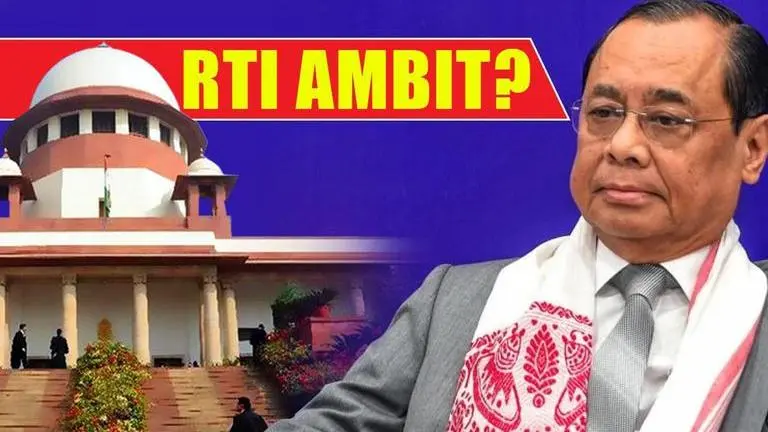Updated 12 November 2019 at 23:19 IST
RTI's applicability to CJI's office: SC to pronounce verdict on Nov 13
The Supreme Court on Wednesday will pronounce the verdict on whether or not the office of Chief Justice of India (CJI) comes under the ambit of the RTI Act
- India News
- 3 min read

The Supreme Court on Wednesday will pronounce the verdict on whether or not the office of Chief Justice of India (CJI) comes under the ambit of the Right to Information (RTI) Act. Earlier, The High Court in its order had declared the CJI's office a "public authority" and said that it should come under the RTI Act.
The order will be passed by a five-judge Constitution bench of Chief Justice Ranjan Gogoi, Justices NV Ramana, DY Chandrachud, Deepak Gupta and Sanjiv Khanna on a petition filed by a Supreme Court Secretary-General challenging the January 2010 judgment of the Delhi High Court.
The bench had reserved the order on April 4. Chief Justice Gogoi had earlier observed that in the name of transparency, one cannot destroy the institution. The Bench, headed by the Chief Justice, had wrapped up the hearing, saying nobody wants a “system of opaqueness”, but the judiciary cannot be destroyed in the name of transparency. “Nobody wants to remain in the state of darkness or keep anybody in the state of darkness,” it had said. “The question is drawing a line. In the name of transparency, you can’t destroy the institution.”
In November 2007, an RTI activist Subhash Chandra Aggarwal had filed an RTI in the Supreme Court seeking information on judges' assets but the information was denied. Aggarwal then approached the Central Information Commission (CIC) which asked the apex court to disclose information on the ground that the Chief Justice of India's office comes within the ambit of the Act. In January 2009, a plea was moved in the Delhi High Court against the CIC order but the same was upheld.
Advertisement
Delhi High Court's order
In a landmark verdict on January 10, 2010, the Delhi High Court had held that the office of the Chief Justice of India comes within the ambit of the Right to Information (RTI) law, saying judicial independence was not a judge’s privilege, but a responsibility cast upon him.
Advertisement
The 88-page judgment was then seen as a personal setback to the then CJI, K.G. Balakrishnan, who has been opposed to disclosure of information relating to judges under the RTI Act. The High Court verdict was delivered by a three-judge bench comprising Chief Justice A.P. Shah (since retired) and Justices Vikramjit Sen and S. Muralidhar. The bench had dismissed a plea of the Supreme Court that contended bringing the CJI’s office within the RTI Act would “hamper” judicial independence.
(With agency inputs)
Published By : Varsha Chavan
Published On: 12 November 2019 at 22:27 IST

